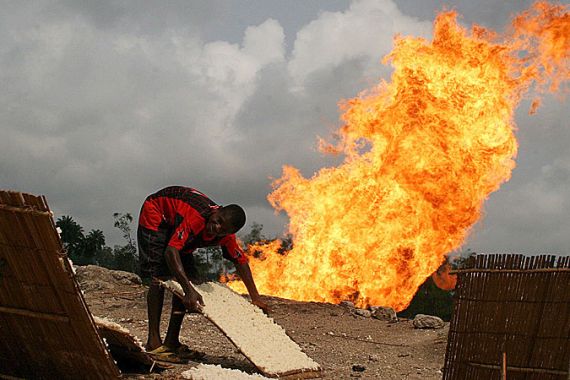Nigerian army tackles oil smugglers
Illegal oil refineries are on the rise in the Niger Delta, encouraged by unemployment and the increasing price of oil.

 |
| Experts say only sustainable employment for unemployed youths will prevent illegal refineries springing up again[EPA] |
Nigerian soldiers have destroyed nearly 500 illegal oil refineries in the Niger Delta in a bid to stop the smuggling of stolen oil in the country.
Special units using gun-boats and helicopters were used to track down the make-shift refineries, located deep in the mangrove forests, the Reuters news agency reported.
Keep reading
list of 4 itemsWhy are nations racing to buy weapons?
Parallel economy: How Russia is defying the West’s boycott
US House approves aid package worth billions for Ukraine, Israel
The refineries consist of several discarded metal drums joined together by pipes, which are filled with crude and heated continuously for several days to produce usable petrol and diesel.
Jafaru Ibrahim, a military commander on the raid, said the smugglers escaped from the scene and no one had been arrested.
“This exercise is going to continue as often as possible so that they do not have freedom of action to continue [these] illegal activities,” Ibrahim said.
Experts say up to 300,000 barrels of crude is stolen every day by smuggling gangs in Nigeria.
Government amnesty
Crude oil thieves – known locally as “bunkerers” – have been a fact of life for years in Africa’s biggest oil and gas industry, puncturing pipelines and costing Nigeria and foreign oil firms millions of dollars in lost revenues each year.
A government amnesty two years ago for gunmen in the Niger Delta, where dirt-poor thatch-roofed villages sit among some of Africa’s biggest industry installations, brought some respite.
But there has been a renewed wave of oil theft as former fighters fed up with the pace of the rehabilitation programme regroup in the creeks to re-establish their illicit business.
Rising world oil prices have pushed the cost of gasoline in Nigeria up by a third to $0.98 a litre over the past three months, increasing demand on the black market and making the illegal refineries as profitable as ever.
The vast wetlands region on the Gulf of Guinea is arguably Africa’s most heinous example of the “resource curse”, where multi-billion dollar oil facilities run by firms including Royal Dutch Shell, Chevron and Agip sit among some of its least developed communities.
Risking lives
The illegal refiners risk their lives to eke out a living in a region where most people survive on $2 a day or less.
“The local communities raised the alarm because of the devastating effects on their waterways and farms, and complaints have also started coming from the oil majors,” Timothy Antigha, military spokesman in the Niger Delta, said.
Antigha said that most of the refined oil ends up on the Nigerian market where it is used in homes for heating and lighting and has been a major cause of explosions because it has a high petrol content.
The involvement of international oil smuggling syndicates in Nigeria’s water ways has also added to the government’s agony in trying to completely eradicate the trade. Last year the Nigerian army intercepted a Greek vessel loaded with 800 tonnes of stolen oil.
President Goodluck Jonathan, the first head of state from the Niger Delta, has pledged to develop the region if he wins April’s election. But similar promises have been made before.
The oil minister said last month that communities in the region would receive an estimated $600m in annual dividends as part of efforts to improve security and development under reforms currently before parliament.
But security experts say that only sustainable employment for tens of thousands of unemployed youths will prevent the illegal refineries springing up again once the army’s back is turned.